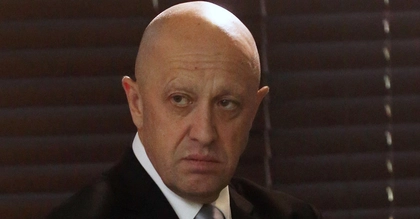The Russian military’s decreasing reliance on Wagner forces around Bakhmut is likely reducing Wagner Group financier Yevgeny Prigozhin’s influence. ISW assessed on Jan. 22 that the Kremlin likely turned to Prigozhin’s irregular forces to get through a rough period following the culmination of Russian conventional forces’ offensive in Luhansk Oblast over the summer of 2022, which misled Prigozhin into overestimating his importance in the Russian military and political spheres.
The Kremlin, however, will not need to appease Prigozhin if Russian conventional forces continue to take responsibility for the Bakhmut frontline. ISW has reported that the Kremlin likely has already been slowly terminating his privileges. Gerasimov and the Russian Ministry of Defense (MoD) have also embarked upon new efforts to professionalize the army, an effort that, if successful, would marginalize parallel military formations such as the Wagner Group.
JOIN US ON TELEGRAM
Follow our coverage of the war on the @Kyivpost_official.
Prigozhin is likely sensing and is overcompensating for his declining influence and has therefore begun to attack the nationalist veteran faction. The veteran faction has been demanding that the Russian military command fix flaws within its conventional campaign instead of focusing on ineffective and unconventional solutions since at least May 2022.
Prigozhin continued on Jan. 28 to berate Igor Girkin – a prominent Russian nationalist voice and a former Russian officer who has connections with the Russian veteran community – with vulgar insults and accusations that he is responsible for Russian forces’ loss of Slovyansk in 2014. Prigozhin accused Girkin, Russian State Duma Parliamentarian and Committee on Defense member Lieutenant General (Ret.) Viktor Sobolev, and Leader of the Russian Liberal Democratic Party Leonid Slutsky of living in a past in which Russia relied on conventional forces.

Russia Starts Mobile Bomb Shelter Production
Sobolev previously supported the Russian MoD effort to professionalize the military by enforcing grooming standards, and Slutsky avidly advocated for the Kremlin to declare mobilization to rectify the dire situation on the frontlines in early fall 2022. Prigozhin went after these three individuals likely in an effort to undermine their credibility and advocacy for reforms and improvements within the military that further marginalize his undisciplined and brutal parallel military forces.
Prigozhin is also facing bribery accusations, which may further diminish his reputation regardless of their validity. Prigozhin responded to a media inquiry on Jan. 27 regarding speculations that he receives bribes from convicts who do not then serve on the front lines but still receive a pardon for their “service.”
The allegations claimed that Prigozhin had recruited and soon released convicted Lipetsk Oblast Parliamentarian Andrey Yaitskiy (who some commentators speculated was physically unfit for military service), which granted him a pardon in exchange for a bribe. Prigozhin attempted to deflect the accusations by claiming that Wagner discharged Yaitskiy with honors following his heavy injuries sustained on the frontlines and included purported testimony from Yaitskiy’s alleged commanders who portrayed him as a hero.
ISW cannot independently verify these bribery accusations against Prigozhin, however, their emergence is notable given that corruption and bribery is endemic in Russia and a hated cultural vice among Russians.
Authors: George Barros, Kateryna Stepanenko, Riley Bailey, Grace Mappes, Angela Howard, and Frederick W. Kagan
See in the full ISW report here.
You can also highlight the text and press Ctrl + Enter






